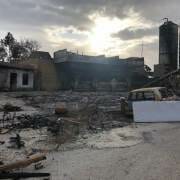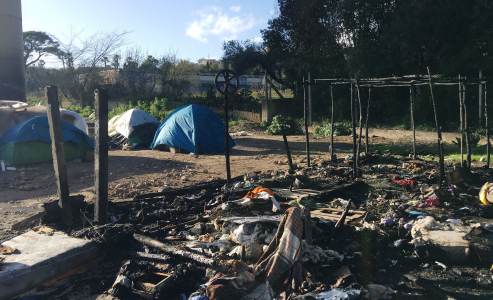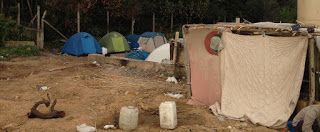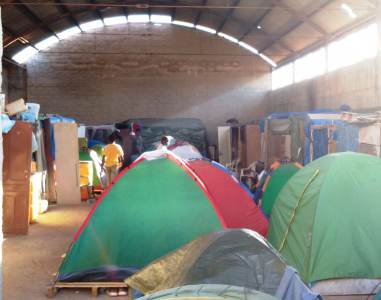Invisible People, Ripe for Exploiting.
After two months, we went back to Campobello di Mazara, to check on the conditions on the campsite at the former olive oil factory, and the migrants left there looking for work. We were contacted by two young African men who told us that they had been once again utterly abandoned by a blind politics, by a citizenry dead to cries for help, and by the passion for exploitation demonstrated by those with mandarin trees bearing fruit.

Ph: The former oil factory confiscated from the Mafia, at Campbell di Mazara
There are around 80 or so people living at Campobello now, all originally from Africa, living in the open countryside between abandoned farmhouses without doors, and shacks made from wood and plastic sheets which they have put up themselves. There is no water or electricity, nor sanitary services. The area is called “Erbe Bianche”, right on the edge of the town, far enough away to be out of the sight of those who consider these people to be merely degrading, rather than realising that the real degradation is the condition in which they are forced to live.
The mattresses lie on the ground under a plastic sheet, to stop them from becoming mud when it rains. You warm yourself up by lighting a fire, where you also cook the food, in battered pots which are difficult to clean. There is no medical assistance and, from the moment in which some of them had their documents taken, they have been to afraid to go to the hospital clinic.
They have been literally hungry for many days now. Not all of them, in fact, have begun to harvest the mandarins, which is the only reason that they find themselves in this small corner of the Campobello countryside. The local community seems to remember them only when they are needed for the harvest work. Then they’re “useful”. For the rest of the time in the area, however, they remain quite literally abandoned to themselves.
Unfortunately we know that these invisible people have been created ad hoc by a system which produces the conditions for exploitation, and it is only in these conditions that we Italians accept the presence of migrants, only when – in absolute silence – they allow themselves to be exploited by this landowner or that gang-master, or anyone else who wants to turn a profit. In these brutal situations, migrants are abandoned not only by institutions (something which is no great surprise), and not only by the media (which has forgotten how to listen and to write), but also by the associations in the area, including the local churches.
“We’ve been abandoned by everyone. We stayed here after finishing the olive harvest, waiting for the mandarins, which still haven’t begun, so for now we’ve got those problems. The cold these past few days hasn’t helped… We’re doing badly”, one Senegalese man tells us in decisive tones.
We brought some blankets, coats and medicines but, despite the young men’s gratitude, we feel useless when confronted with these dynamics, ones which are ever more present in our country, and what makes things even worse for these young men is people’s general indifference.
“We’re not zombies, but we might as well be. They don’t want us to rent rooms because they’re afraid. We want to pay them, because some of us can, but they don’t want us around, they’d rather leave us out in the cold in this ghetto, coming to get us for the harvest, at whatever conditions they set.” And indeed, given their vulnerable conditions and the invisibility imposed on them by the system, the migrants have significantly lowered the cost of their own labour so that they can have a Euro in their pockets, or simply not to die from hunger.
This exploitation has been born out of segregation and indifference. Our political system creates these zones where it can kill the hope and destroy the dreams of so many young men who nonetheless demonstrate their anger with great composure, anger against the psychological violence they have undergone, against the uncivilised conditions in which they are forced to live. At Campobello, the violation of human rights is simply a daily occurrence.
Yet again we want to know why, and how, no trade union has come to check on all of this, how come no union is present in situations like this which are known to everyone, why the migrants in Campobello have been abused by this system for years. We ask ourselves, and we ask the institutional agents as well, how come there is an ex-olive oil factory confiscated from the Mafia which has been completely abandoned, and used for only 2 months each year (during the olive harvest, the area’s goldmine), which could provide refuge and care for people who work the earth, rather than serving as an open-air rubbish dump.
The mayor doesn’t respond, the Prefecture doesn’t respond, the church pretends not to know anything, the associations are as invisible as the migrants and the unions are playing a power game, and all this explains the shame which has fallen on Campobello di Mazara.
“I didn’t want this life, I’m too ill, the cold gets right in me and I can’t sleep at night. I’ve been living in Italy for years, and for years someone’s been getting fat off me.” ‘R’ is quite clear in explaining a concept which we too have understood for some time: the business which a migrant is forced to endure from the moment in which he leaves his own country, and which does not finish until he has lost everything, including his soul.
“And when they finish exploiting us here, we go to Catania for another harvest, and we’ll build some other shack. This isn’t the life I dreamt of as a child, but it’s they life that you make us live in Italy.”
Alberto Biondo
Borderline Sicilia
Project “OpenEurope” – Oxfam Italia, Diaconia Valdese, Borderline Sicilia Onlus
Translation by Richard Braude








